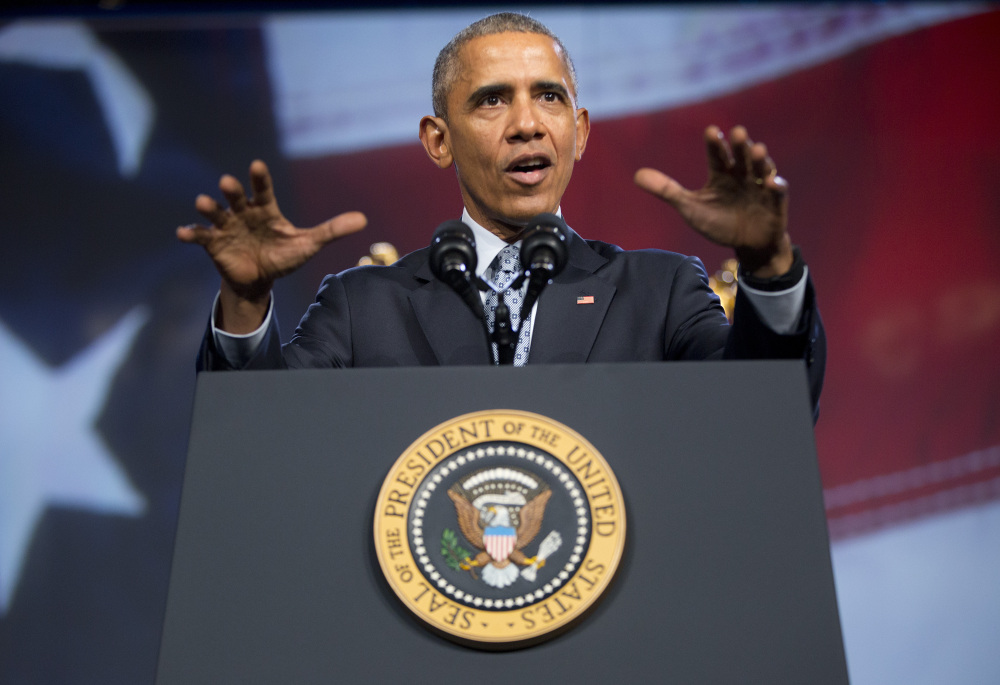WASHINGTON — The Obama administration says an expansive 12-nation Pacific Rim trade pact released Thursday would rewrite the rules of trade and investment in a fast-growing region, reducing barriers of entry for U.S. businesses and safeguarding intellectual property, while also protecting the rights of workers and the environment.
The Trans-Pacific Partnership would lower tariffs on thousands of goods and services, including beef, pork, dairy and automobiles, and it would establish an international tribunal to litigate disputes between member countries and multinational corporations.
Nations including Brunei, Malaysia and Vietnam, in special implementation plans agreed to with the United States, have promised to change their laws to allow trade unions to form and operate freely, to improve protections for foreign workers and those who may have been illegally trafficked, and to outlaw employment discrimination.
Hollywood production studios could gain new protections for films, and pharmaceutical companies could gain new protections for patents on next-generation biologic drugs.
“I know that if you take a look at what’s actually in the TPP, you will see that this is, in fact, a new type of trade deal that puts American workers first,” President Obama wrote in a blog post on Medium on Thursday morning, after the United States and 11 other nations made the text of the 30 chapters of the TPP available to the public for the first time.
“When it comes to Asia, one of the world’s fastest-growing regions, the rulebook is up for grabs,” Obama said. “And if we don’t pass this agreement – if America doesn’t write those rules – then countries like China will. And that would only threaten American jobs and workers and undermine American leadership around the world.”
The release of the document, which runs hundreds of pages, is the starting point for what is expected to be a long and bruising fight to win final ratification in Congress for one of the president’s top priorities. A month after trade ministers reached agreement on the deal in Atlanta, the public will get a look at the details.
After the text’s release, Obama administration officials said, the president will notify lawmakers of his intent to sign the accord. He must then wait 90 days before he can apply his signature and send the agreement to Capitol Hill, under the terms of “fast-track” trade legislation Congress approved in the spring.
But the fierce political fight waged in the spring over Obama’s trade agenda is ramping up again on both sides of the aisle. The TPP accord has been thrust into the 2016 contest for the White House. Candidates including Democrats Hillary Rodham Clinton and Sen. Bernie Sanders (I-Vt.) and Republican Donald Trump have publicly opposed the pact.
Many of the main flashpoints in the document have emerged in the past several months with leaks of draft portions of the text. Ford Motor Co. on Thursday denounced the terms governing currency manipulation, which are not contained in the main agreement.
“The currency forum does nothing to change the status quo,” the company said in a statement. “It falls outside of TPP, and it fails to include dispute settlement mechanisms to ensure global rules prohibiting currency manipulation are enforced.”
Facing fierce opposition from large swaths of the Democratic Party, Obama has sought to overcome the deep-seated skepticism from labor unions and progressives over past trade deals by pledging that the TPP will establish strong, enforceable protections for workers and the environment.
Administration officials said that if all goes smoothly, the deal could be in the hands of Congress by March, but when lawmakers would schedule a vote remains highly uncertain. Although the fast-track authority lays out a specific timetable – and prevents lawmakers from filibustering or amending the agreement – congressional leaders could choose to delay the process indefinitely, even until after Obama leaves office in January 2017, officials said.
In general, Republican leaders have been supportive of Obama’s trade push. But several, including Senate Majority Leader Mitch McConnell (Ky.) and Senate Finance Committee Chairman Orrin G. Hatch (Utah), raised concerns about provisions related to the tobacco and pharmaceutical industries after trade ministers announced a final agreement last month. New House Speaker Paul D. Ryan (Wis.) must balance his support of free trade with a conservative faction that is determined not to grant Obama any political victories.
“Enactment of TPP is going to require the administration to fully explain the benefits of this agreement and what it will mean for American families,” Ryan said in a statement that did not give any indication of when he might allow a vote. “I continue to reserve judgement on the path ahead. But I remain hopeful that our negotiators reached an agreement that the House can support because a successful TPP would mean more good jobs for American workers and greater U.S. influence in the world.”
trade-1stld-writethru
Keywords:
Copy the Story LinkSend questions/comments to the editors.



Success. Please wait for the page to reload. If the page does not reload within 5 seconds, please refresh the page.
Enter your email and password to access comments.
Hi, to comment on stories you must . This profile is in addition to your subscription and website login.
Already have a commenting profile? .
Invalid username/password.
Please check your email to confirm and complete your registration.
Only subscribers are eligible to post comments. Please subscribe or login first for digital access. Here’s why.
Use the form below to reset your password. When you've submitted your account email, we will send an email with a reset code.